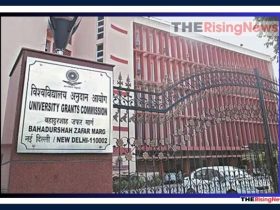NEW DELHI, July 27, 2024 – A significant DU fee hike protest unfolded outside Delhi University Vice-Chancellor Yogesh Singh’s office on Saturday. The Krantikari Yuva Sangathan (KYS), a student organization representing working-class and marginalized sections, led the demonstration against recent fee increases and substandard study materials provided by the School of Open Learning (SOL).
The DU fee hike protest coincided with an Executive Council meeting at the university, where policy proposals affecting students were under discussion. Protesters raised slogans against the privatization of education, arguing that higher education is becoming increasingly inaccessible to students from marginalized backgrounds.
KYS members demanded an immediate rollback of the fee hikes, which they claim have placed a significant financial burden on students. The student body also called for a re-evaluation of SOL study materials, citing numerous factual and grammatical errors.
“Since the implementation of the National Education Policy 2020, we’ve seen a significant fee hike in public-funded higher education institutions,” KYS stated in a press release. The organization expressed concerns about the Higher Education Financing Agency (HEFA) pushing for self-financed courses over University Grants Commission (UGC) grants.
The DU fee hike protest highlighted several key issues:
- Fee Increases: Since December last year, Delhi University has substantially raised fees for various courses, impacting educational accessibility.
- Study Material Quality: SOL study materials were previously rejected due to errors, prompting demands for re-evaluation.
- Academic Audit: KYS called for an academic audit of SOL to address quality concerns.
- Seat Increase: Protesters demanded an increase in available seats to accommodate more students.
The recent fee hikes at Delhi University have sparked widespread concern among students, particularly those from marginalized communities. KYS argues that these increases, coupled with the push for self-financed courses, are making higher education less accessible to many deserving students.
Vice-Chancellor Yogesh Singh’s use of emergency powers to approve fee hikes in undergraduate, postgraduate, and PhD programs has been a significant point of contention. The DU fee hike protest aimed to bring attention to this issue and push for a reconsideration of the decision.
The quality of SOL study materials has also come under scrutiny. Protesters emphasized the need for high-quality educational resources, especially for students who rely on distance learning options. The re-evaluation of these materials is crucial to ensure students receive accurate and well-prepared study guides.
As the DU fee hike protest unfolded, it became clear that the issues raised by KYS reflect broader concerns in India’s higher education landscape. The National Education Policy 2020 has introduced significant changes to the funding and structure of higher education, sparking debates about the balance between financial sustainability and educational accessibility.
The push by HEFA for self-financed courses over UGC grants has been particularly controversial. Critics argue that this approach prioritizes financial considerations over educational quality and accessibility, potentially exacerbating inequalities in higher education.
The DU fee hike protest serves as a reminder of the ongoing challenges facing students in India. As universities like Delhi University grapple with financial pressures and policy changes, students from marginalized backgrounds find themselves at risk of being priced out of quality education.
KYS and other student organizations continue to advocate for more inclusive and accessible higher education policies. They argue that fee hikes and subpar study materials disproportionately affect students from disadvantaged backgrounds, widening the educational gap in society.
As the Executive Council meeting progressed, protesters hoped their voices would be heard and considered in future policy decisions. The outcome of this DU fee hike protest could have significant implications for the future of higher education accessibility at Delhi University and potentially influence similar discussions at other institutions across India.
For more information and updates on the DU fee hike protest and related issues, interested parties can visit the official KYS website at www.kys.org.in and the Delhi University website at www.du.ac.in.
More
- NIIT University Admission 2024: BTech, BBA, iMBA Programs, Apply @niituniversity.in by August 5
- IIT Delhi Launches Certificate Programme in Hybrid Electric Vehicle Design Starting September 29
- IGNOU Admission July 2024: Apply Now for UG & PG Courses @ignou.samarth.edu.in – Secure Your Spot by June 30-2024
- Kerala University UG Admission 2024-25: First Seat Allotment Result Released Today Check Now @keralauniversity.ac.in
- Anna University Admission 2024: UG & PG Schedule Announced, Check Last Dates for Application Forms @annauniv.edu
- DU UG Admission 2024-25: Apply Now via CSAS Portal at ugadmission.uod.ac.in









